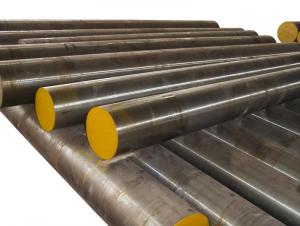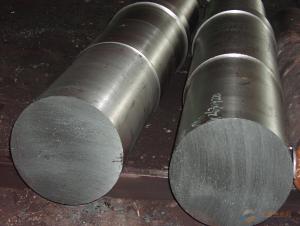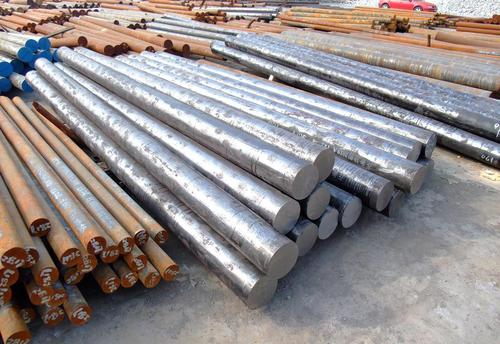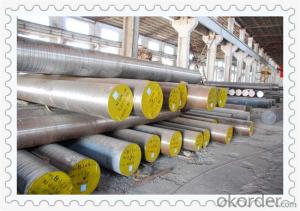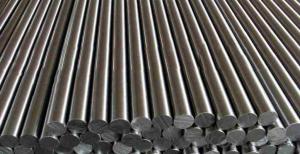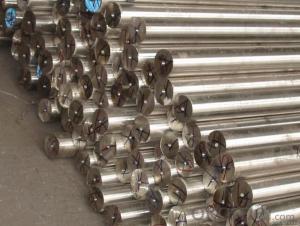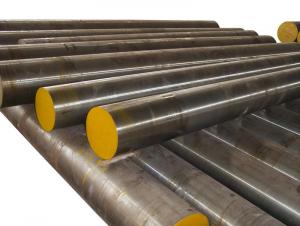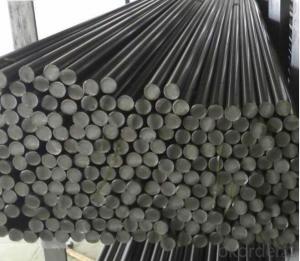Hot Rolled Alloy Bearing Steel Round Bars for Construction
- Loading Port:
- Tianjin
- Payment Terms:
- TT or LC
- Min Order Qty:
- 25 m.t.
- Supply Capability:
- 100000 m.t./month
OKorder Service Pledge
OKorder Financial Service
You Might Also Like
Product Description:
High Quality Bearing steel is used for manufacturing ball, roller bearing steel and rings. Bearing in work is under great pressure and friction, so have high demands bearing steel and hardness and resistance, and high elastic limit.
Bearing steels are used for ball and roller bearing applications and are comprised of low carbon steels and high carbon through harden able steel.
For example, bearing ring, steel rolling mill, machinery, 100Cr6 bearing steel ball is widely used in high-speed and low-noise bearing, bicycle, motorcycle, automobile, bags electronically.
Product Applications:
High Quality Hot Rolled Alloy Bearing Steel Round Bars are ideal for structural applications and are widely used in the construction of buildings and bridges, and the manufacturing, petrochemical, and transportation industries.
1. Steel round bar products is used in construction and a large number of architectural and engineering structures. And it can be used in production of handrail, windows, machinery, telecom and curtain wall.
2. It can be used in the fields like metal mines, cement plants, water coal slurry, power stations and chemical industry.
3. Besides, we can supply some especial material steel round bar that can be used for main shaft of steamer, hummer shank, with big section and supper force.
4. Recommended watchcase factory, screw factory and other cold stamping products industry use.
Product Advantages:
OKorder's High Quality Hot Rolled Alloy Bearing Steel Round Bars are durable, strong, and resist corrosion.
1. The steel in which the main interstitial alloying constituent is carbon in the range of 0.12–2.0%.
2. As the carbon percentage content rises, steel has the ability to become harder and stronger through heat treating; however it becomes less ductile.
3. Regardless of the heat treatment, higher carbon content reduces weld ability. In carbon steels, the higher carbon content lowers the melting point.
4. Quality should be in conformity with the specification of the manufacturer. Quantity and packing conditions should be in conformity with the term in the contract.
Main Product Features:
· Premium quality
· Prompt delivery & seaworthy packing (30 days after receiving deposit)
· Corrosion resistance
· Can be recycled and reused
· Mill test certification
· Professional Service
· Competitive pricing
Specifications of High Quality Hot Rolled Alloy Bearing Steel Round Bars
1. Grade: Q235, A36, SS400, S235JR
2. Feature: Unbreakable, grinding resistant and high impact value
3. Diameter: 8mm-150mm
4. Performance: Mainly for civil construction
5. Characteristics: Even hardness, no deformation, no breaking, no mal-roundness
6. Technique: Hot rolled
7. Mass: Mass (kg/m) = Diameter (mm) × Diameter (mm) × 0.00617
Packaging & Delivery of Mild Hot Rolled Steel Round Bars for Bults and Nults
Packaging Detail: All goods are packed in bundle with steel strips and shipped by break bulk vessel or container (depend on target market and different ports)
Delivery Detail: 45 days
Trade terms: FOB, CFR, CIF
MOQ: 25 tons per specification; we can negotiate the quantity if the specification is normal or we have stock of one specification.
Weight: The price invoicing on theoretical weight basis or actual weight basis depends on customer’s request.
Shipment: The shipment of bulk break or container is depends on customer’s request and the situation of the port of destination.
Documents given: Full set of original clean on board bill of lading; Original signed commercial invoice; Original packing list; Policy of insurance; Certificate of origin and what the target market needs.
Production Flow of High Quality Hot Rolled Alloy Bearing Steel Round Bars
Material prepare (billet) — heat up — rough rolling — precision rolling — cooling — packing — storage and transportation
FAQ:
Q1: The products are invoicing on theoritical weight or on actual weight?
A1: We can do it in both manners, according to the customers' request.
Q2: What is the normal tolerance of High Quality Hot Rolled Alloy Bearing Steel Round Bars?
A2: Normally 3%-5%, but we can also produce the goods according to the customers' requests.
Q3: How soon can we receive the product after purchase?
A3: Within three days of placing an order, we will begin production. The specific shipping date is dependent upon international and government factors, but is typically 7 to 10 workdays.
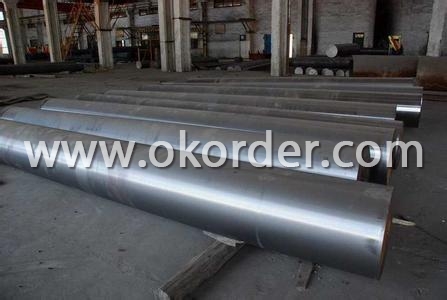
- Q: What are the different forging techniques used for special steel?
- Some of the different forging techniques used for special steel include open die forging, closed die forging, and ring rolling.
- Q: What are the different quality control measures for special steel production?
- There are several quality control measures implemented during special steel production, including rigorous inspections at various stages of the manufacturing process, such as raw material testing, chemical composition analysis, and heat treatment verification. Additionally, non-destructive testing techniques, such as ultrasonic testing and magnetic particle inspection, are employed to detect any defects or inconsistencies in the steel's structure. Furthermore, dimensional and surface quality checks are performed to ensure that the final product meets the required specifications and standards.
- Q: How does special steel perform in stamping applications?
- Special steel performs exceptionally well in stamping applications. It is specifically designed to withstand the intense pressure and forces involved in stamping processes. Its high strength and hardness properties enable it to maintain its shape and integrity during stamping, resulting in precise and accurate formed parts. Additionally, special steel's excellent wear resistance helps prolong tool life, reducing maintenance and replacement costs. Overall, special steel is a reliable and efficient material choice for stamping applications.
- Q: Can special steel be used in the telecommunications equipment manufacturing industry?
- Yes, special steel can be used in the telecommunications equipment manufacturing industry. Special steel, known for its exceptional strength, durability, and resistance to corrosion, can be utilized in the production of various telecommunications equipment such as antennas, satellites, transmission towers, and optical fiber cables. Its properties make it ideal for withstanding harsh environmental conditions, ensuring the longevity and reliability of telecommunications infrastructure.
- Q: What are the properties of stainless tool steel?
- Stainless tool steel possesses several key properties that make it a popular choice for various applications. Firstly, it has excellent corrosion resistance, making it resistant to rust and staining. This property allows stainless tool steel to maintain its integrity and durability in harsh environments or when exposed to moisture. Additionally, stainless tool steel exhibits high hardness and wear resistance, enabling it to withstand heavy use and retain its sharpness for extended periods. It also has good toughness and impact resistance, ensuring it can handle intense forces without fracturing or breaking. These properties make stainless tool steel suitable for manufacturing tools and components used in industries such as automotive, aerospace, and cutlery.
- Q: What is the role of chromium in special steel?
- The role of chromium in special steel is to provide enhanced corrosion resistance, increased hardness, and improved strength. It forms a protective layer on the surface of the steel, known as chromium oxide, which prevents the steel from rusting or corroding. Chromium also helps in improving the steel's ability to withstand high temperatures and maintain its structural integrity.
- Q: How does special steel perform in cryogenic toughness?
- Special steel is known for its exceptional performance in cryogenic toughness. When exposed to extremely low temperatures, such as those found in cryogenic applications, the toughness of regular steel decreases significantly. However, special steel is specifically designed to withstand such extreme conditions and maintain its toughness and ductility. The properties of special steel, such as its composition and microstructure, are carefully engineered to ensure its high performance in cryogenic environments. With a unique combination of alloying elements and heat treatment processes, special steel can resist brittle fracture and maintain its strength even at temperatures as low as -196 degrees Celsius (-321 degrees Fahrenheit). The excellent cryogenic toughness of special steel makes it an ideal choice for various applications, including liquefied natural gas (LNG) storage and transportation, aerospace engineering, and medical equipment used in cryogenic medicine. It provides the necessary reliability and safety when subjected to extreme cold temperatures, ensuring the integrity and functionality of the materials and structures it is used in. Overall, special steel's exceptional performance in cryogenic toughness sets it apart from regular steel and makes it a preferred choice for applications that require reliable and durable materials in extremely low-temperature environments.
- Q: What are the main challenges in welding special steel?
- The main challenges in welding special steel include its high carbon content, which can lead to cracking and distortion during the welding process. Additionally, special steels often have higher alloy content, making them prone to heat-affected zone (HAZ) issues such as reduced strength and corrosion resistance. Controlling the heat input and using suitable welding techniques and filler materials are crucial for successfully welding special steel.
- Q: What are the specific requirements for special steel used in the railway track industry?
- The specific requirements for special steel used in the railway track industry are designed to ensure the safety, durability, and efficiency of the tracks. Firstly, the steel used for railway tracks must have a high tensile strength to withstand the heavy loads and constant stress applied by trains. This strength allows the tracks to maintain their shape and prevent deformation, ensuring smooth and stable movement of the trains. Secondly, the special steel used in railway tracks must have excellent wear resistance. As trains constantly traverse the tracks, there is significant friction and wear between the train wheels and the tracks. Therefore, the steel needs to be able to withstand this wear and tear, minimizing the need for frequent maintenance and replacement. Thirdly, the steel used in railway tracks must have good fatigue resistance. Trains exert repetitive loads on the tracks, which can lead to fatigue failure if the steel is not able to withstand this cyclic loading. Fatigue resistance ensures that the tracks remain intact and safe for prolonged periods, reducing the risk of accidents. Furthermore, the steel must have high corrosion resistance to withstand exposure to various environmental and weather conditions. Railway tracks are exposed to moisture, temperature variations, and other corrosive elements, making it crucial for the steel to have the ability to resist rust and corrosion. In addition to these mechanical and physical properties, the steel used in the railway track industry must also meet specific dimensional and geometric requirements. This includes precise dimensions, straightness, and alignment to ensure proper installation and alignment of the tracks, allowing for smooth and safe train operations. Overall, the specific requirements for special steel used in the railway track industry revolve around strength, wear resistance, fatigue resistance, corrosion resistance, and dimensional accuracy. Meeting these requirements is essential to ensure the safety, longevity, and efficiency of railway tracks, facilitating smooth and reliable train transportation.
- Q: What are the requirements for special steel used in chemical processing?
- The requirements for special steel used in chemical processing include high corrosion resistance, exceptional strength and durability, resistance to high temperatures and extreme pressure, and compatibility with the specific chemicals being processed.
Send your message to us
Hot Rolled Alloy Bearing Steel Round Bars for Construction
- Loading Port:
- Tianjin
- Payment Terms:
- TT or LC
- Min Order Qty:
- 25 m.t.
- Supply Capability:
- 100000 m.t./month
OKorder Service Pledge
OKorder Financial Service
Similar products
Hot products
Hot Searches
Related keywords

